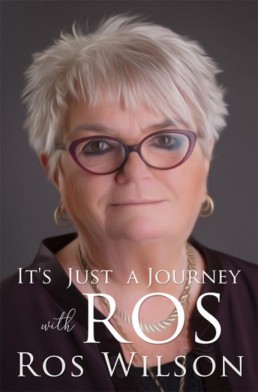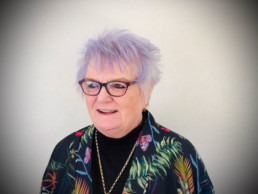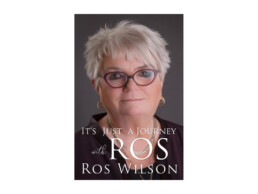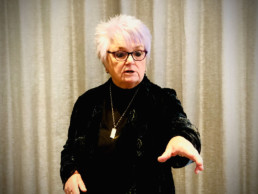Reflections
Welcome to my website. Whether you are wanting to read a blog, get some ideas for resources, book an input for a conference or other professional development, catch up on my books or just see what I am up to – this is the place to be: my very first personal website after 55 years in education.
Not many people are lucky enough to be active in education for as long as I have, and I am eternally grateful for the series of un-planned events that have enabled this good fortune.
- I didn’t plan to develop Big Writing: I discovered the missing links through thorough assessment of thousands of pieces of writing.
- I didn’t plan to spend 17 years of my life around the Bahamas and the Caribbean: I went for ‘fun’ for 3 years!
- I didn’t plan to start up a whole new career path when I returned to England: I was just looking for a teaching job to support my two children.
- I didn’t plan to be an LA Advisor in 1992, I was invited to apply when it was recognised that – due to the influence of a significant Caymanian advisor who had vast knowledge and understanding of assessment from working in the USA – my knowledge and understanding of assessment was beyond most at the time.
- I didn’t plan to go back overseas, having been abroad for seventeen years previously: I was asked by a dear professional friend to help him do a ‘start-up’ of a brand new school and it sounded too good an experience to miss (not to mention fun).
- I didn’t plan to work as an independent consultant in education: I was just afraid that no-one would employ me when I returned to the UK aged fifty-six, so decided to give it a go.
- I didn’t plan to work as Primary Strategy Manager: I was approached by a former colleague and loved every moment of building a strong and talented strategy team.
- I didn’t plan to write my professional life as a book: I was told repeatedly by colleagues all over the world that I should put some of my funny – and true stories – into print.
- I didn’t plan to seek out new and highly valued professional friends: I was invited to speak at the first ‘Beyond Levels conferences in 2015 and met so many wonderful people there and through the many following events - and through Twitter.
All I ever wanted to do was to help children to succeed and build their futures – and in doing so I inadvertently built my own – unplanned! But I always wanted to be a WRITER and an ACTRESS! I had more half-finished books stuffed in a case under my bed than I have had homes (and the latter is over 30!). Hopefully, I am now achieving the dream.
My advice would always be – give it a go! Don’t be afraid to seize exciting opportunities that come your way. Life is a journey and the decisions you take shape the directions you travel.
Welcome to my website and welcome to my world!
It's Just a Journey
Concord, Massachusetts, U.S. Ralph Waldo Emerson (May 25, 1803 – April 27, 1882) was an American essayist, lecturer, philosopher, and poet who led the transcendentalist movement of the mid-19th century. (Wikipedia)
Emerson is accredited with being the first to say:
“Life is a journey, not a destination.”
My life has been one heck of a journey, taking me halfway round the world and back and punctuated by many funny, scary and traumatic experiences on the way. My talks have long reflected this and now – to my pride – my new book, ‘It’s Just a Journey with Ros’ tells the tale.
I started writing ‘Journeys’ virtually, through my talks at conferences and events. I will never forget the first time I told the story of ‘Bernard’ – Head of Maths in the first school I taught in. Having been invited to speak at the first ever ‘Beyond Levels’ conference organised by Dame Alison Peacock (Chair of the Chartered College for teachers) and former Head teacher, Julie Lilly, I continued to speak at subsequent events. After one well known speaker had the audience laughing at his tales, Dame Alison challenged me publicly to:
“Follow that, Ros!”
So I did; and those of you who have heard the stories from my early days as a teacher will know why, on his very first public ‘outing’, Bernard brought the house down! He has been with me ever since on my journeys around the country, as has Stan, Mrs. Sparrowhawk and Michael’s gift.
You will be fascinated by tales of my very first flight, the American Missile Base and living through one of the most destructive hurricanes to hit the Caribbean.
We lay, mainly silent, cuddling a child apiece, and listening wide eyed as the horrific noise outside grew to a thunderous roar. The hours passed — midnight and beyond, and the building rocked and shook, the roof creaked and groaned, lifting and sinking continuously, and many a time we feared the whole thing was going to fly off, or the walls would come down, but it withstood the fearsome storm.
The winds screamed on, and the rain was a dense, horizontal curtain of white — driving parallel to the ground, as impenetrable to see through as the thickest fog. Suddenly, at about four in the morning, silence fell. No wind or rain could be heard… only a deep, wet darkness could be discerned through the doors.
“T’is de eye…” muttered the Braccers in hushed, but knowing tones, and we all sat silently and waited for the predicted, resumed onslaught from the opposite direction…
We sat and gaped at the terrain before us, acres of huge boulders, many as large as a car, were piled between six and ten feet deep from the gently lapping water’s edge up to where the road must have been and on across the land and round the houses to the foot of the bluff. Sticking out from between the rocks, there were palm trees and whole sea grapes uprooted and protruding at crazy angles, punctuated by telegraph poles snapped like twigs, planks and iron bars (presumably from smaller constructions in yards), thousands of huge, full grown sponges ripped from the seabed, and heart-breaking masses of dead fish of all sizes.
(It’s Just a Journey with Ros: May 2020)
You will be amazed by my adventures on the ocean, on the roads and in travels overseas.
But most of all, I hope you will agree that – at the end of the day – life is just a series of journeys; physical journeys, emotional journeys, professional journeys and learning journeys.
You will laugh, you may cry, but please enjoy it.
It's Just a Journey with Ros
Apollo moonshots could be seen taking off from Florida when Ros Wilson’s career took off in the Bahamas. A child of the forties, she trained as a teacher in the sixties and has also taught in the Cayman Islands, the Middle East and even the UK. Having been hit by Hurricane Alan, honked out by a dead cat dragged in for the nature table and having helped haul sheep out of a crisis at Christmas, she found she’d salted enough wealth away in the bank of experience to take on consultancy work, too.
She now writes authoritatively on educational practice and policy.
Of popular and professional interest, her story can now be read for fun, hilarity or interest by all. No parent ill-informed about the professional background of school teachers, nor would-be schoolteachers ill-informed about what they could be in for, will regret relaxing and enjoying the fun and laughter of It’s Just a Journey with Ros by Ros Wilson.

Curriculum Issues and Challenges
As the end approaches to a very large assignment of planning a customised whole school curriculum for a primary school chain, I realise that this initiative has challenged my thinking on the curriculum and its role in learning in ways this type of work never has done before.
Perhaps this is due to previous naivety? Or ignorance? Or arrogance? It is very difficult to wind back the clock and know why.
Or perhaps it is due to greater clarity of thinking at national level, with many highly informed educationalists speaking out without a culture of fear? Certainly, those voices have forced me to answer some questions that were not relevant in the turmoil of previous constant curriculum change.
Should a Curriculum Be Knowledge Driven or Skill Driven?
Every curriculum in existence identifies the knowledge to be taught throughout the curriculum. There is no curriculum without knowledge. In identifying the skills to be taught, developed and refined it is necessary to do this in a context of knowledge as skills change or morph as contexts change. Thus the application of research skills – for example – may vary when required for a study on the ‘gastric brooding frog’ last seen in Australia in 1985, or on the existence of a massive step pyramid exposed recently in China, with the 4,300 year old city that once flourished around it. Although both areas to be researched are ‘historical’ in that they are in the past, the approaches to the research might be significantly different and the outcomes of one might remain purely historical whilst the other will be more likely to be scientific and environmental. Planning an entirely skill driven curriculum renders the subject knowledge to be unpredictable, lacking in long term co-ordination, sometimes repetitive and sometimes lacking in direction towards academic goals.
A 21st century curriculum should be designed to enable teaching across subjects, embedding knowledge and understanding through a wide range of diverse but relevant and challenging opportunities and experiences, whilst exposing pupils to a rich, varied and rigorous education about the school, the locality of the school, the region and the host country of the school, the continent and the wider world it is located in, including its associated features, processes and vulnerabilities.
I recommend that a quality thematic curriculum be organised in three annual medium-term plans (or ‘maps’) one for every term of each academic year of the school. These maps should provide a summary of the key teaching points and experiences to take place within that term, organised by subject and presented in sub-divisions by the curriculum subject they address. There should then be an associated support document that gives further detail and guidance with some suggested activities when felt helpful, in sections labelled by curriculum subject. It is assumed that the medium term map and the ASD will be the class teacher’s main point of reference for short term or lesson planning.
How are theme titles identified?
Identification of titles for the themes sometimes occurs naturally during the process but is never finalised for all terms until completion of the process. The titles are purely for ease of identification, for cohesion and for pupil motivation and comprehension. They should never dictate the content for content-driven subjects.
Why do we not recommend half termly themes?
The length of half terms is an unpredictable process in many schools, driven by external factors such as religious holidays, public holidays and the needs of the society in which the school is located. Thus, the likelihood of a precise allocation being completed exactly within any given half term is slim. In England, in recent years, some half terms have been as long as ten weeks or as short as four weeks.
The coherence of working to one theme with several changes of direction or shifts of focus within the term means teachers are able to develop a meaningful programme that enables real continuity of learning, knowledge, skill progression and understanding.
Summary
Rethinking something you assume you know quite a lot about is a worthwhile exercise. Even if the conclusions that you come to are ‘I still believe what I say is correct’, the process of review will have enhanced your thinking and clarified the ‘why?’ that every thinking person should be asking.
For me, this process led me to realise that the recent initiative I embarked on was still too restricted by the confines and requirements of a national curriculum, however it empowered me to find ways of enhancing the many opportunities that do exist for creativity and independence within the national curriculum and for enriching the children’s experiences through a wealth of discovery, investigation, creativity and exposure to reality, to experts and to authentic learning experiences.
Home Schooling Advice for Parents and Teachers
The National Literacy Trust estimates that 5.1 million adults in the UK are illiterate, with a reading and writing age below aged 11. That is not ‘illiterate’. ‘Illiterate means ‘unable to read or write’ according to the dictionary. Most 8, 9 and 10 year olds can read and write quite adequately for daily purposes, they just can’t (or probably wouldn’t want to) read Charles Dickens or Robert Louis Stevenson.
When I am writing resources or activities for parents I work with the parents of my beloved former inner-city Middle School in Bradford in mind, or the many impoverished areas in Kirklees where I worked, or Chris Dyson’s beloved Parklands Primary School in Seacroft, Leeds. Almost every one of those parents, unless they are new to English as a language, can read The Sun or The Mirror newspapers, can write a shopping list or a note to a family member. They have functional language – although it may not be accurate it serves the daily purposes. I write for parents in a style to make what I am saying accessible for everyone who has a reading age of 8+.
There is a misnomer circulating that all home schooling should be practising skills and knowledge already taught and that parents should not be teaching new material. This is not only patronising – it is the route to failure. Parents make home-schooling more fun when they are addressing subjects and aspects they themselves enjoyed or are interested in or would like to learn with their children. If they are following our advice (see Home Schooling for Parents) they will be using Google (or similar search engines) to find ‘How to learn Spanish for Children’ or ‘How did the Tudor people live? For Children’ or whatever their interest is. If the material is online for children to learn from it, the parents will be perfectly well able to access and use it too.
I advise that parents plan 4 to 5 sessions a day, lasting up to 3 hours for children aged 5 to 7 and 3 to 5 hours a day for children aged 8 to 11. There should be a short relaxing’ break between the sessions with a proper playtime in the middle. The relaxing break may be colouring the next bit of a pattern, doing hand and arm exercises to music or singing along to a popular song.
The daily sessions should be a mix of academic with artistic each day, interspersed to maintain interest. So, a daily routine might be:
Monday: Maths; colour; history (The Egyptians) ; writing (may be about the Egyptians); sing; PE to TV
Tuesday: Reading; colour; maths; sing; music to TV or internet; geography (Egypt from Internet); art
Wednesday: Story writing; colour; maths; sing; PE; construction (Lego or boxes etc); snuggling story
Thursday: Science (how to …); colour; maths; art (Egyptian wall paintings); role play or puppets; write a playscript
Friday: Maths; sing; art; read / act or use puppets with the playscript; colour; dance; snuggling story
And so on…
Being conscious of the possible reading age of your audience has certain responsibilities.
They include:
- Don’t make sentences too long or complex.
- Don’t put more than 2 points in a sentence. Would just one be better?
- Don’t use hard words if a simple one would do.
- The technical language is not the priority – it can soon be learnt later.
- The theory behind is not the priority – it can soon be provided later.
- Use a larger font than usual.
- Don’t set too much repetitive work without variation.
- Don’t assume parents can’t or shouldn’t tackle something new. They will if it interests them.
- Give parents choices. Eg ask if they would like to do the Romans, the Vikings or the Aztecs?
- Explain that in models like the one above, the word ‘Egyptian’ could be changed to any other peoples from the past.





